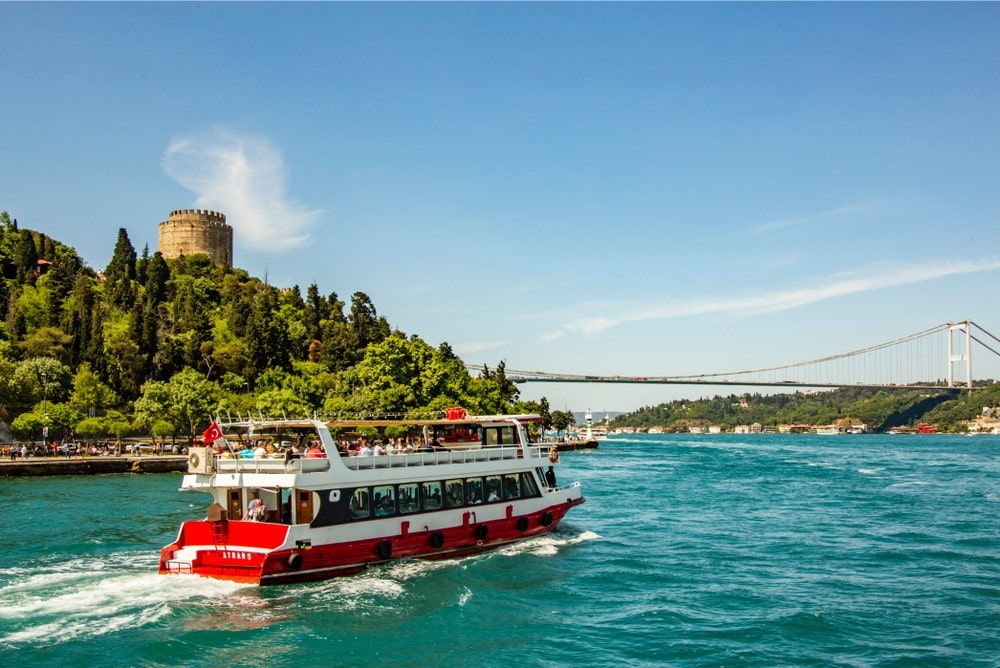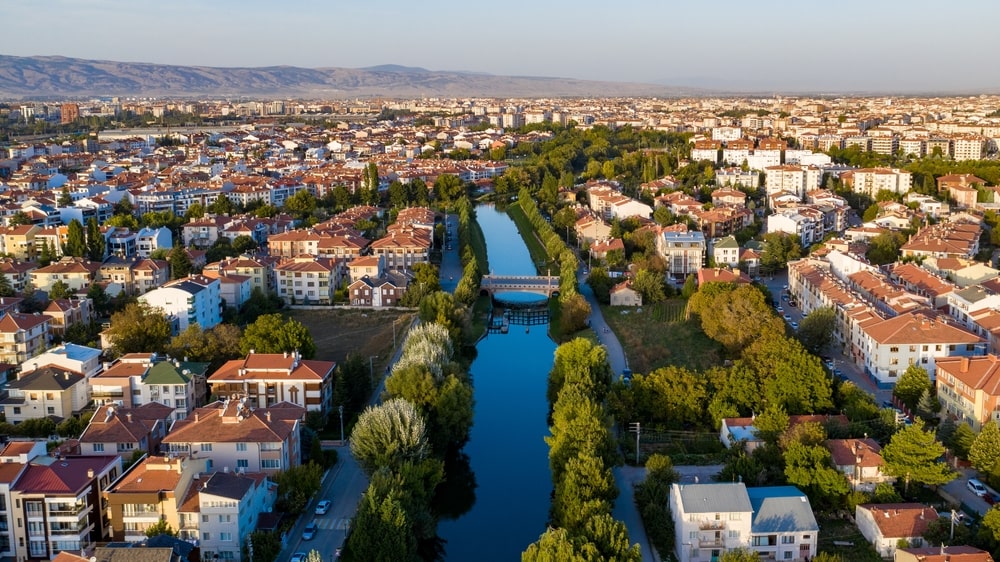Are you looking for a travel experience that allows you to explore stunning landscapes while minimizing your impact on the environment? Look no further than eco-tourism in Turkey. This captivating country offers a myriad of sustainable travel options that not only showcase its natural wonders but also contribute to their preservation.
From the enchanting turquoise coast to the breathtaking Cappadocia region, Turkey boasts an impressive array of eco-friendly destinations. Whether you’re interested in hiking through protected national parks, staying in eco-lodges that prioritize sustainable practices, or participating in community-based tourism initiatives, Turkey has it all.
By choosing eco-tourism in Turkey, you can immerse yourself in the country’s rich cultural heritage while respecting its delicate ecosystems. Experience the tranquility of pristine beaches, witness the marvels of ancient ruins, and indulge in traditional cuisine with a focus on local and organic ingredients.
Ready to embark on a sustainable adventure that will leave a positive impact? Join us as we navigate the world of eco-tourism in Turkey, sharing insights on the best destinations, experiences, and practices to make your journey truly unforgettable.
The Importance of Sustainable Travel in Turkey
Sustainable travel is essential for preserving the natural and cultural heritage of Turkey. With a diverse range of ecosystems, including coastal areas, forests, and mountains, it is crucial to promote responsible tourism practices that minimize negative impacts on the environment.
Turkey is home to numerous protected areas, such as national parks and nature reserves, which are crucial for preserving biodiversity and providing habitats for endangered species. By practicing sustainable travel, visitors can help protect these fragile ecosystems and ensure their longevity for future generations.
Additionally, sustainable tourism practices can have a positive impact on local communities by promoting economic development and preserving traditional ways of life. By supporting community-based initiatives, eco-tourists can contribute to the well-being of local residents and foster a sense of cultural appreciation and understanding.
Eco-Tourism Destinations in Turkey
Turkey offers a wealth of eco-tourism destinations that showcase its natural wonders and provide visitors with unique experiences. One of the most popular destinations is the Turquoise Coast, known for its crystal-clear waters and picturesque beaches. Visitors can explore hidden coves, go snorkeling or diving to discover vibrant marine life, and even participate in beach clean-up activities to contribute to the conservation of this pristine coastline.
For those seeking a more adventurous experience, the Cappadocia region is a must-visit. Famous for its unique rock formations and underground cities, Cappadocia offers opportunities for hiking, hot air ballooning, and exploring ancient cave dwellings. By choosing eco-friendly guided tours, visitors can learn about the geological and cultural significance of this UNESCO World Heritage Site while minimizing their ecological footprint.
Another eco-tourism gem in Turkey is the Kaz Mountains, located in the northwestern part of the country. This mountain range is known for its rich biodiversity, including rare plant species and endemic wildlife. Visitors can embark on hiking trails, bird-watching expeditions, and even participate in reforestation projects to help restore the natural habitat of the Kaz Mountains.
Ecological Practices and Initiatives in Turkey
Turkey has made significant strides in implementing ecological practices and initiatives to promote sustainable tourism. One such initiative is the “Green Star” certification program, which recognizes hotels and accommodations that prioritize environmentally friendly practices. These establishments focus on energy and water conservation, waste reduction, and the use of renewable resources. By choosing to stay in Green Star-certified accommodations, eco-tourists can support businesses that are committed to reducing their environmental impact.
In addition to accommodation initiatives, Turkey has implemented measures to protect its marine ecosystems. The country has established Marine Protected Areas (MPAs) along its coastlines, aiming to preserve the biodiversity of these fragile habitats. Visitors can participate in eco-friendly boat tours and snorkeling trips that adhere to strict guidelines to minimize disturbance to marine life and habitats.
Furthermore, Turkey has implemented waste management programs to reduce plastic pollution and encourage recycling. Many eco-tourism destinations have designated recycling bins, and some even organize beach clean-up activities where visitors can actively contribute to preserving the cleanliness of the coastal areas.
Eco-Friendly Accommodations in Turkey
When it comes to eco-friendly accommodations, Eco-Tourism in Turkey offers a wide range of options to suit every traveler’s preferences. From rustic eco-lodges nestled in nature to luxurious boutique hotels with sustainable practices, there is something for everyone.
Eco-lodges are a popular choice for eco-conscious travelers seeking a close connection with nature. These accommodations are often built using locally sourced materials and utilize renewable energy sources such as solar power. Many eco-lodges also prioritize water conservation, waste management, and organic gardening practices. Staying in an eco-lodge allows visitors to experience the natural beauty of Turkey while minimizing their ecological footprint.
For those seeking an eco-conscious retreat in Turkey, there are boutique hotels that prioritize sustainability. These establishments often incorporate energy-efficient technologies, use organic and locally sourced materials, and support the local community through partnerships with local artisans and farmers. By choosing a sustainable boutique hotel, visitors can indulge in comfort and luxury while knowing that their stay supports environmentally responsible practices, contributing to the burgeoning eco-tourism in Turkey.
Activities and Experiences for Eco-Tourism in Turkey
Turkey offers a plethora of activities and experiences for eco-tourists, ensuring that there is something for everyone. Eco-tourism in Turkey allows outdoor enthusiasts to embark on hiking or biking adventures in the country’s national parks, such as the UNESCO-listed Göreme National Park or the Yedigöller National Park. These protected areas offer well-maintained trails that showcase the natural beauty of Turkey, including stunning landscapes, unique rock formations, and diverse wildlife.
For water lovers, Turkey’s coastline provides opportunities for swimming, snorkeling, and diving. The Mediterranean and Aegean Seas are home to an abundance of marine life, including colorful fish, dolphins, and even sea turtles. By choosing eco-certified tour operators, visitors can enjoy these activities while ensuring that they are conducted in an environmentally friendly manner.
Cultural enthusiasts can also immerse themselves in Turkey’s rich heritage by visiting ancient ruins and historical sites. Places like Ephesus, Troy, and Hierapolis offer a glimpse into the country’s ancient civilizations and architectural marvels. By joining guided tours led by knowledgeable locals, eco-tourists can engage in Eco-Tourism in Turkey, learning about the historical and cultural significance of these sites while supporting preservation efforts.
Responsible Tourism Guidelines for Eco-Tourists in Turkey
To ensure a truly sustainable travel experience and support eco-tourism in Turkey, it is important for eco-tourists to adhere to responsible tourism guidelines. Here are some tips to keep in mind when exploring Turkey’s natural wonders:
- Respect the environment: Leave no trace and take only memories. Avoid littering, stick to designated trails, and refrain from damaging or removing any natural or cultural resources.
- Support local communities: Choose community-based tourism initiatives that directly benefit local residents. Purchase locally made products and support small businesses to contribute to the local economy.
- Conserve resources: Practice water and energy conservation in your accommodations. Reuse towels and linens, turn off lights and air conditioning when not in use, and minimize water usage by taking shorter showers.
- Reduce waste: Avoid single-use plastics by bringing your reusable water bottle and shopping bag. Dispose of waste properly in designated bins and participate in recycling programs whenever possible.
- Learn about the local culture: Respect local customs, traditions, and etiquette. Educate yourself about the cultural significance of the places you visit to foster a deeper appreciation and understanding.
By following these guidelines, eco-tourists can ensure that their travel experiences are not only enjoyable but also sustainable and respectful of the environment and local communities.
Eco-Tourism Organizations and Resources in Turkey
For travelers seeking further information and resources on eco-tourism in Turkey, several organizations and initiatives can provide valuable insights and support. Here are a few noteworthy ones:
- TURSAB: The Association of Turkish Travel Agencies (TURSAB) promotes sustainable tourism practices and provides information on eco-friendly accommodations, guided tours, and destinations in Turkey.
- Travelers for Change: This non-profit organization focuses on sustainable tourism development and organizes volunteer projects and educational programs to empower local communities and protect natural resources.
- The Turkish Ministry of Culture and Tourism: The ministry’s official website provides information on sustainable travel practices, eco-tourism destinations, and initiatives in Turkey.
- Sustainable Tourism Certification Programs: Look for establishments with certifications such as Green Star or Travelife, which indicate their commitment to sustainable practices.
These resources can assist eco-tourists in planning their trips, making informed choices, and ensuring that their travel experiences align with their sustainability values.
Eco-Tourism Success Stories in Turkey
Turkey has seen several eco-tourism success stories that highlight the positive impact of sustainable travel. One such success story is the Butterfly Valley in Fethiye. This secluded beach was once threatened by uncontrolled tourism development and waste pollution. However, through community-led initiatives and the establishment of a marine protected area, the Butterfly Valley is now a thriving eco-tourism destination that promotes responsible tourism practices and protects the habitat of various butterfly species.
Another success story in Eco-Tourism in Turkey is the village of Sirince, located near the ancient city of Ephesus. The village was facing depopulation and economic decline until it embraced eco-tourism. Today, Sirince is known for its organic farming practices, locally produced wine, and sustainable accommodations. The village has become a model for rural development through eco-tourism, attracting visitors who appreciate its traditional architecture, cultural heritage, and commitment to sustainability.
These success stories serve as inspiration and demonstrate the positive outcomes that can be achieved through sustainable travel practices. By supporting eco-tourism initiatives, visitors can contribute to the preservation of Turkey’s natural and cultural treasures while enjoying unique and enriching travel experiences.
Final Thoughts
Eco-tourism in Turkey offers a remarkable opportunity to explore the country’s natural wonders while minimizing your impact on the environment. From the stunning turquoise coast to the enchanting Cappadocia region, Turkey has a wealth of eco-friendly destinations and experiences to offer.
By practicing sustainable travel, supporting local communities, and respecting the environment, eco-tourists can contribute to the preservation of Turkey’s biodiversity and cultural heritage. Whether you choose to stay in eco-lodges, participate in community-based initiatives, or explore protected national parks, your journey through eco-tourism in Turkey will be both rewarding and impactful.
So, pack your bags, embrace sustainable travel, and embark on an unforgettable adventure that allows you to connect with nature, immerse yourself in culture, and make a positive difference in the world. Turkey awaits your eco-friendly exploration!









